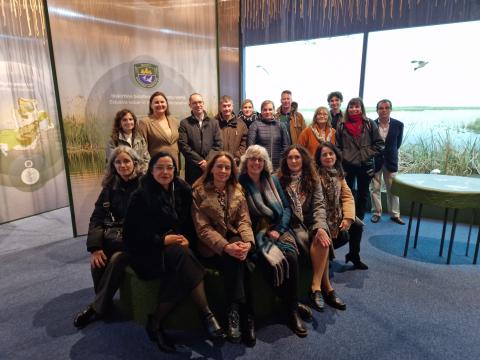Study Visit to Lithuania: Digital Tourism in Alytus District
A study visit hosted by the Lithuanian partner was held from the 15th to the 16th of October in the Alytus district of Lithuania bringing together partners from Romania, Germany, the Netherlands, Portugal, Spain, and Hungary. The group explored Alytus' digital strategies, designed to enhance cultural engagement and showcase the region’s heritage. Led by a highly enthusiastic team committed to using digital solutions in order to create a more resilient tourism sector for their region.
Day 1: Opening Sessions, Digital Solutions, and Cultural Engagement
The visit began with a warm welcome from the Alytus project team, followed by presentations from the local Tourism Information and Cultural Center. Participants saw firsthand how the Alytus district uses digital tools like QR codes, virtual tours, and interactive displays to blend history and culture into an easily accessible package for tourists.
A quiz organized by the lead partner, Héviz Municipality, set the tone for collaboration and provided participants with a clear understanding of essential reporting requirements and communication objectives. Later, Alytus District Mayor Rasa Vitkauskienė welcomed the group and shared her vision for expanding tourism through digital initiatives to showcase Alytus’s rich heritage using modern solutions.
One unique stop was a virtual tour of Kurnėnai Laurynas Radziukynas School, where the partners could take a look at one of Alytus’s historic sites through digital tools. Participants enjoyed a traditional calligraphy activity, a blend of heritage with modern technology.
The day ended with a visit to the Žuvintas Biosphere Reserve, where interactive stations and a guided tour shared ecological insights and demonstrated that conservation efforts are just as important to the disctrict as their other objectives.
Day 2: Expanding Digital Tourism Across Urban and Cultural Sites
On the second day participants visited more sites showcasing Alytus’s commitment to digital tourism. At Butrimonys Fountain and Town Square, participants saw how digital lighting and urban design can attract and engage visitors without destroying the traditional architecture of the town square.
The group then explored the Butrimonys Interactive Museum, Alytus’s first digital museum, which uses interactive exhibits to share the region’s multicultural heritage represemnting that it’s possible to use digitalisation without taking away from the importance of highlighting the regions history.
At Punios Panemunės Dzūko Pirkia, the role of digital tools in culinary tourism took center stage as participants explored Dzūkų cooking traditions through interactive technologies.
The day wrapped up at Punia Mound, where QR codes provided instant historical and ecological context to the beautiful landscape sorrounding the district, demonstrating Alytus’s integration of digital tools with nature.
Summary
The Alytus team is formed by experts who are happy to share and develop digital solutions without losing sight of the importance of history, heritage and nature keeping a healthy balance of traditional and modern in their efforts to make tourism more resilient in their region!

